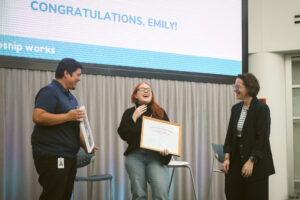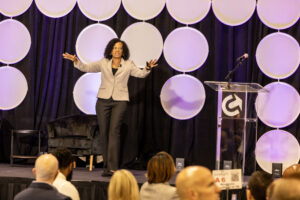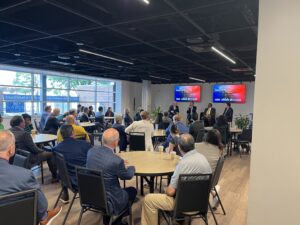Amy Donahue
Do you know what the typical employer spends to accommodate an employee with a disability? For most, the answer is nothing.
According to a report from the Job Accommodation Network, a service of the US Department of Labor’s Office of Disability Employment Policy, 59 percent of accommodations cost absolutely nothing for the organization, while the rest typically cost only $500. Something as simple as a laminated schedule, noise canceling head phones or a flexible schedule could mean hiring a committed, reliable employee for your business.
October is both Global Diversity Awareness Month and National Disability Employment Awareness Month. To highlight this, the Downtown Council of the Chattanooga Area Chamber of Commerce hosted a local expert panel with representatives from the AIM Center, Signal Centers, the University of Tennessee at Chattanooga’s MOSAIC program and the YMCA of Metropolitan Chattanooga on the typically low cost and high reward of hiring persons with disabilities.
Standing for Achievement, Independence and Motivation, the AIM Center provides education, employment, housing, wellness and socialization opportunities for adults in recovery from serious mental illness.
Natalie Rothwell, a Licensed Master Social Worker and Team Leader for the Individual Placement and Support (IPS) program at the AIM Center, sums up the desire of most AIM Center members:
“People managing mental illness want what everyone else wants: to be productive members of society, to feel a sense of purpose, to be connected to a community, to be accepted for who they are and to feel wanted and needed in their social system.”
AIM Center members are typically employed in occupations like housekeeping, janitorial services, food service, retail, light manufacturing, customer service, transportation and hospitality. While very few accommodations are typically need according to Rothwell, part-time positions of four to six hours per day, two to three days per week have the highest success rate for their members.
“Employers often struggle to find motivated candidates for entry-level work,” says Rothwell. “Our members are eager, dedicated and hardworking. Aside from this, we also provide support to the employer.”
In the AIM Center’s Transitional Employment (TE) program, employers have 100 percent job coverage. Meaning, if an AIM Center member is unable to complete his or her assigned job for any reason, an AIM Center employee will come to the business and complete the member’s tasks preventing any business suffering.
AIM Center partners include Acropolis, the Tennessee Aquarium, Target, Walgreens and the YMCA which had a high turnover rate in their laundry department prior to hiring AIM Center members.
The MOSAIC program is a comprehensive support program for UTC students with Autism Spectrum Disorders (ASD). Since 2010 and led by Dr. Michelle Rigler, MOSIAC has served 82 students with a five year curriculum plan, coaching, mentoring, supervised study and a reverse career fair where employers visit student stations versus the traditional model. With past students now employed in fields like education, environmental science, tech, accounting and psychology, Rigler stresses individuals with ASD typically are kind, honest people who like structure.
“The biggest benefits of people with ASD are loyalty and reliability,” says Rigler. “When someone with ASD is employed, work becomes part of his or her routine. This means rarely calling in sick and staying at a company long term.”
Flexible schedules, written feedback, modified interview processes and professional mentors are the typical accommodations Rigler sees individuals with ASD need.
Whether you are a hiring manger for a large company or a small business owner, programs at places like the AIM Center and UTC MOSAIC might have a dedicated employee awaiting your call.








